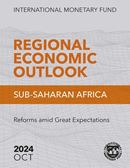This web page provides information on the activities of the Office, views of the IMF staff, and the relations between Benin and the IMF. Additional information can be found on Benin and IMF country page, including official IMF reports and Executive Board documents in English and French that deal with Benin.
At a Glance
- Benin joined the Fund on July 10, 1963.
- Total Quotas: SDR 123.8 Million
- Loans outstanding: ECF Arrangements SDR 109,29 Million
- Last Article IV Consultation: The 2019 Article IV Consultation staff report was discussed by the Executive Board on June 21, 2019. (IMF Country Report No. 19/203, July 2, 2019)
Fraudulent Scam Emails
We would like to bring to the notice of the general public that several variants of financial scam letters purporting to be sanctioned by the International Monetary Fund (IMF) or authored by high ranking IMF officials are currently in circulation, and may appear on official letterhead containing the IMF logo. The scam letters instruct potential victims to contact the IMF for issuance of a “Certificate of International Capital Transfer” or other forms of approval, to enable them receives large sums of monies as beneficiaries. The contact e-mail information is always BOGUS and unsuspecting individuals are then requested to send their personal banking details which the scammers utilize for their fraudulent activities.For more information please see Fraudulent Scam Emails Using the Name of the IMF.
IMF's Work on Benin
-
November 15, 2024
Today (November 15, 2025), at COP29, the Government of Benin together with international financial institutions and development partners (DPs), unveiled an ambitious vision for climate action.
-
November 11, 2024
An International Monetary Fund (IMF) staff team led by Mr. Antonio David held meetings from October 28 to November 9, 2024, on the sixth review of the agreement with Niger under the Extended Credit Facility (ECF) and the second review of the arrangement under the Resilience and Sustainability Facility (RSF) and conducted discussions on the 2024 Article IV Consultation
-
November 7, 2024
A team from the International Monetary Fund (IMF) led by Niko Hobdari, Mission Chief for Guinea Bissau, held meetings in Bissau during October 29 - November 6, 2024 to discuss macroeconomic policies in the context of the Seventh Review of the ECF arrangement.
-
Introductory Remarks at the IMF’s African Department Press Briefing
October 25, 2024
Thank you for joining us today for the release of the October IMF Regional Economic Outlook for sub-Saharan Africa. Before we begin and take your questions, I would like to share some thoughts on the current economic developments in the region. The first point I would like to make is that economic growth in sub-Saharan Africa remains subdued, especially in per capita terms.
-
October 17, 2024
IMF has reached staff-level agreement with Benin on the Fifth Review of Benin’s EFF/ECF and the Second Review of the Resilience and Sustainability Facility (RSF).
Office Activities
-
Press Conference at the End of the Fourth Review and the 2019 Article IV Consultation Mission (français)
Video in French
May 14, 2019
-
Interview with ORTF (Beninese Television)
This interview with the resident representative aimed to present the key messages of the 2018 fall REO, discuss Benin’s recent economic development and highlight the IMF role on building capacity through TA and external training to reach out to more people.
November 30, 2018
-
May 28, 2018
-
Third Edition of the “Open House Day” for Students and Academia, Bénin Révélé Magazine
Article in French - The objective of this event was to to present what the Fund does in general and in Benin with emphasis on the IMF’s capacity development work
February 28, 2018
-
January 25, 2017
Regional Economic Outlook
October 25, 2024
Sub-Saharan African countries are implementing difficult and much needed reforms to restore macroeconomic stability, and while overall imbalances have started to narrow, the picture is varied. Policymakers face three main hurdles. First, regional growth, at a projected 3.6 percent in 2024, is generally subdued and uneven, although it is expected to recover modestly next year to 4.2 percent. Second, financing conditions continue to be tight. Third, the complex interplay of poverty, scarce opportunities, and weak governance--compounded by a higher cost of living and short-term hardships linked to macroeconomic adjustment--are fueling social frustration. Within this environment, policymakers face a difficult balancing act in striving for macroeconomic stability while also working to address development needs and ensure that reforms are socially and politically acceptable. Protecting the most vulnerable from the costs of adjustment and realizing reforms that create sufficient jobs will be critical to mobilize public support.
Read the Report
Departmental Papers on Africa





